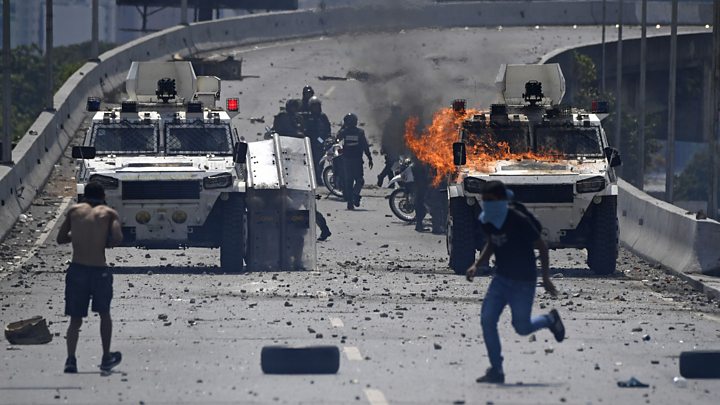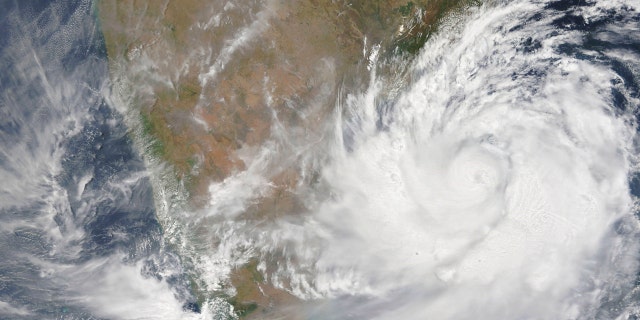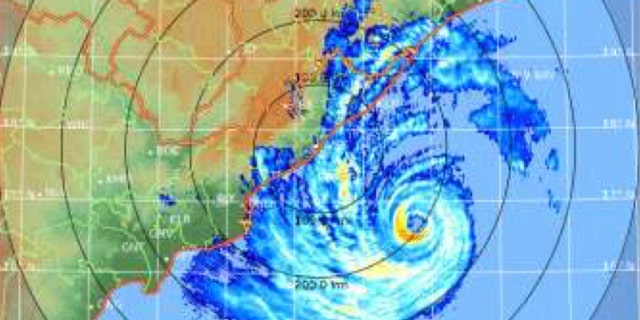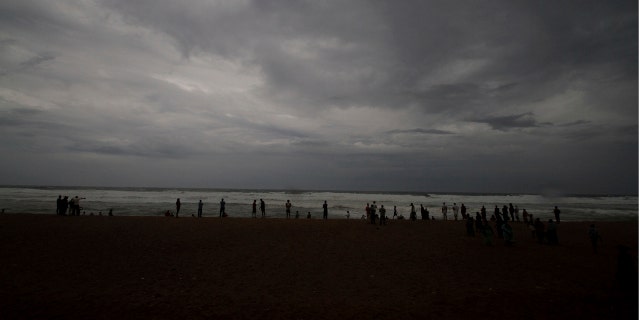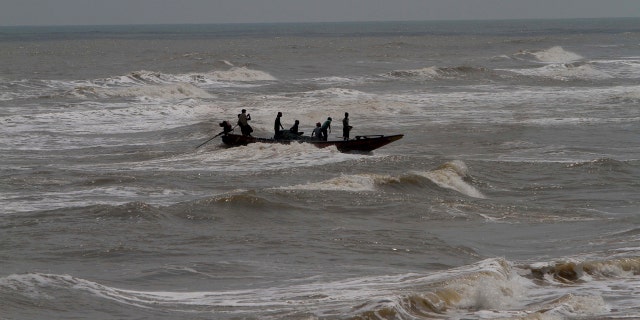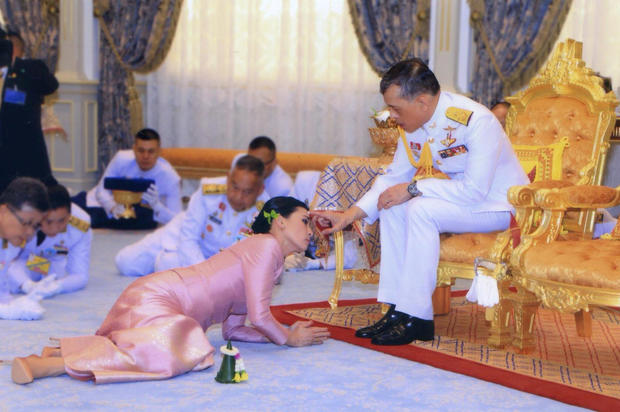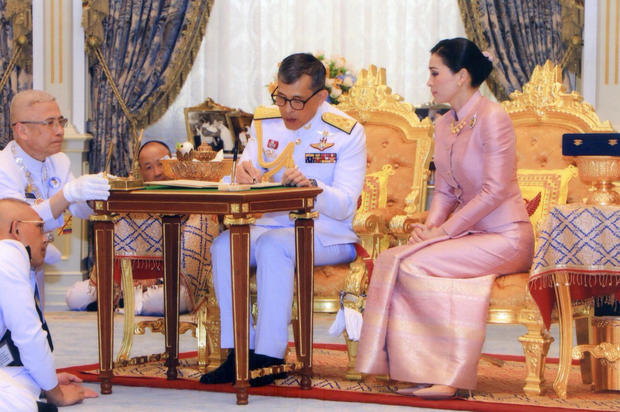• Cyclone Fani, one of the strongest storms to batter the Indian subcontinent in decades, made landfall near Puri, India, around 8 a.m. on Friday, lashing the coast with winds gusting at more than 120 miles per hour.
• Tens of millions of people are potentially in the cyclone’s path, and more than a million were evacuated this week from coastal areas. Large sections of coastal India and Bangladesh are threatened by storm surges, and heavy rains could cause rivers to breach.
• The fast-moving storm struck the coast as the equivalent of a Category 5 hurricane. Soon after it made landfall, meteorologists predicted it would be downgraded within hours to a “very severe” storm from an “extremely severe” storm.
‘We live in fear,’ coastal resident says of storm
Streets along India’s coast were largely empty as residents heeded warnings from the India Meteorological Department to stay indoors.
“In Bhubaneswar, we are all indoors,” said Jagdish Chandra Rout, head of communications for Gopalpur Port Limited. “Nobody is visible on the road, nothing is moving on the road.”
Mr. Rout said he felt the area was much better prepared for the storm than in 1999, when more than 10,000 people died in a cyclone.
“We feel that yes, we may have some difficult days ahead, but no panic,” he said. “We are prepared, we know what is coming when and where.”
In Puri, winds and rainfall were increasing, said Bishwajit Panda, a 19-year-old college student.
“We fear that our house should not be damaged, our shop should not be damaged, some tree should not fall on house, electric pole should not fall on shop,” he said. “We live in fear. During the days of cyclone it is the life of fear we live.”

Mass evacuations in India and Bangladesh
The Indian authorities evacuated more than a million people from parts of the nation’s eastern coast this week.
Using television, loudspeakers, radio and text messages to warn residents about the dangers of the storm, India’s disaster relief agency and meteorological department warned of the “total destruction” to thatched huts in some districts, major damage to roads, the uprooting of power poles and the potential danger from flying objects.
Cyclone Fani is forecast to drop as much as eight inches of rain on northern parts of the state of Andhra Pradesh and on the state of Odisha.
Schools have been closed, fisherman asked to keep off the water and tourists urged to leave the city of Puri, a Hindu pilgrimage site where an elaborate, centuries-old temple could be at risk of severe damage. Airports in the cyclone’s path were closing and hundreds of trains have been canceled.
Along Odisha’s coast, more than 850 storm shelters have been opened, said Bishnupada Sethi, the state’s special relief commissioner. Each can hold about 1,000 people, along with livestock.
“People are reluctant to leave their homes, though, which is problematic,” Mr. Sethi said on Thursday.
In Bangladesh, as the storm approached on Friday the government said it had evacuated half a million coastal residents to shelters by 11 a.m.
The government there, similarly, suspended fishing operations, closed ports and ordered an early harvest of rice crops.
Cyclone’s effects felt on Mount Everest
The cyclone was affecting the weather as far away as Mount Everest, where climbers on their way to the summit turned around after conditions worsened.
At Camp 2, 21,000 feet above sea level, climbers reported an increase in cloud cover and moisture, and high winds tore apart tents. Many climbers from higher up the mountain began making their way down to Base Camp, at 17,600 feet above sea level.
Nepal’s Ministry of Home Affairs banned helicopters from flying in high mountain areas through the end of the weekend and issued a warning to mountaineers and trekkers on the mountain. More than 1,000 people, including climbers, high-altitude guides, support staff and government officials, have reached Everest Base Camp since the spring climbing season began in March.
A history of devastating cyclones
The Bay of Bengal has experienced many deadly tropical cyclones, the result of warm air and water temperatures producing storms that strike the large populations along the coast.
Officials said Cyclone Fani could be the most powerful to strike India since 1999, when a cyclone lingered for more than a day over India’s eastern coast, flooding villages, blowing apart houses and ultimately killing more than 10,000 people.
Since that storm, the authorities in the region have significantly improved disaster preparation and response capabilities, strengthening coastal embankments and preparing evacuation routes, according to a World Bank report. Subsequent major storms have resulted in far fewer deaths.
The state of Odisha was much better prepared for Cyclone Phailin in 2013. About one million people were evacuated, more than twice as many as in 1999, and the storm killed 45 people, the World Bank said.
“All of these efforts bore fruit when Cyclone Phailin made landfall,” the report said.
Cyclone Fani could still bring severe dangers to the region, however, threatening flooding in inland river basins, depending on its path, in the Ganges River delta region, where the Indian city of Kolkata is home to millions.
In 2007, Cyclone Sidr killed at least 3,000 people in nearby Bangladesh, and in 1991, a cyclone killed at least 1,000 there and left millions homeless. In 1970, the so-called Great Bhola Cyclone drove a tidal wave into what was then East Pakistan, in a disaster that killed an estimated 300,000 people, according to the World Meteorological Organization’s World Weather & Climate Extremes Archive.
“Unfortunately this region, especially the delta area, has produced the highest death tolls from tropical cyclones on the planet,” said Mr. Herndon, the storm researcher. “Many people live in regions barely above sea level.”
And Cyclone Fani has already proved “one of the most intense in the past 20 years,” according to Clare Nullis, a spokeswoman for the World Meteorological Organization.
https://www.nytimes.com/2019/05/02/world/asia/cyclone-fani-india-live.html
2019-05-03 05:28:05Z
52780281317115


